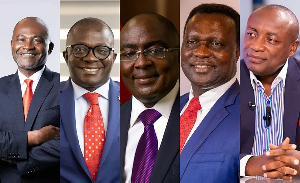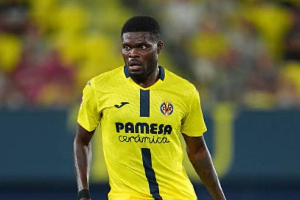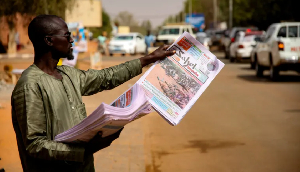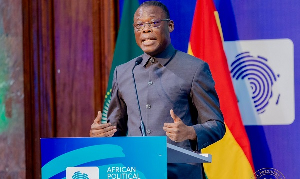Opinions of Thursday, 8 February 2018
Columnist: Esther A. Armah
Strong men, weak institutions
Domelevo, Amidu and Despite. Three strong men navigating weak institutions. The first is an Auditor General seeking prosecutorial power to reinvigorate the state purse; the second is a Special Prosecutor with a reputation for integrity; and the third is a gender award winning businessman putting some of his fortune into better health with a children’s ward at 37 hospital.
A nation is clapping for this. I, like thousands of others, was excited to hear Amidu’s name as Special Prosecutor. I listened in awe and respect as the Auditor General laid out the issues of financial malfeasance and called for the power to haul the offenders into corridors of financial justice. I clapped for Despite as I pictured the lives saved due to his generosity regarding his children’s ward donation.
These are laudable acts; these are moments and men whose leadership is to be applauded. These are steps in making change where it is so profoundly needed. As we applaud, celebrate and laud the actions of these individual men – a note of caution, a moment to reflect and interrogate is necessary.
Our real work is building institutions. Individual strong men are not a substitute for institutional power.
I am not suggesting strong individuals don’t matter, I am saying a stronger citizenry matters too. And I am inviting us not to be less engaged as citizens, nor to imagine that simply putting something in the hands of a great man means we can abdicate our oversight responsibility.
Engaged citizenry is part of the functioning institution that is nation building. I am a citizen. I work in a sector – mine is media. I ask myself what role I play in strengthening my sector. What qualities, abilities and vision do I contribute to building a strong media industry? Ask yourself the same question of your role within your sector.
The consistent mistake we make here in Ghana is we say let us trust him – and it is too often a him – to do the job, he is a great man. We put far too much trust into individual hands and fail to recognize our ongoing work is to stay engaged. We, the nation, must have oversight.
I call on us to replace our strong men with strong collectives. I call on us to include strong women in our strong leadership narratives. I invite us to recognize our power, not his power.
Individuals stand within the strength of thriving institutions. That is how they flourish. As a Continent our ‘strong men leadership’ history is deep. We name one after the other across our 54 nations; and histories are conflated to that one individual. The danger is it teaches a saviour mentality. Corruption is solved because Amidu is in place; state coffers will be overflowing with cash because Domelevo has come. Children’s lives will be saved because Despite donated a children’s ward to 37 hospital.
You cannot philanthropy your way out of poverty. Philanthropy is not policy. A gender-award winning businessmen whose generosity is admirable, and to be applauded, does not transform a crumbling health sector. And it is a health sector that is required to really change the lives of patients; so we do not have abandoned, fully built hospitals that are without doctors and leave patients without care. What is actually crucial is a thriving Ghana Health Service buttressed by an active private health sector.
Ministries are also institutions. A visionary president with inspirational words that move and inspire do not alone enable Ministries to flourish. And each Ministry requires a combination of visionary leadership and skilled staff to execute its mandate.
So, our celebrations – and I too have joined them – must be tempered with the recognition that the work is not creating another Amidu, Domelevo or Despite. It is building strong institutions that function and where structures are in place so that those who work within them have clarity, direction, guidance, opportunity – but also face sanction and consequence for wrong doing.
We are addicted to strong men leadership narratives as a pathway out of poverty into progress and prosperity. We reward mediocrity in men; and so often punish – or worse overlook – brilliance in women. Our nation building narratives do not include the strong women whose leadership could help – and have helped – create sustainable structures and thriving institutions.
In Ghana – and across too many African nations – we make leadership about wielding personal power over others and amassing personal wealth. We seek miracles rather than build movements.
Nation building has never been the result of the work from a few strong men – even though too often history has been written – or rather rewritten and reimagined – with a few good men named as leaders of entire nations and movements. History tells other stories. There are fuller, important narratives and those too must be told.
February is Black History Month in America. It is a month that sometimes ignites tensions between Africans on the Continent and the African American community, as a cycle of names such as Martin Luther King, Malcolm X, Rosa Parks and Harriet Tubman are circulated for mass consumption. Ghana has a thriving and growing African American community. February’s dedication to connections between Ghana and African American history would tell other stories.
Fuller narratives would reveal Martin Luther King traveled to Ghana for the 1957 inauguration of Ghana’s first president Osagyefo Kwame Nkrumah. Dr. King would return to the States where he would deliver a speech about what he had learned – and what the United States could learn – from Ghana. Fuller histories would connect the financing of Ghana’s independent movement to the market women whose business savvy financed the movement and without whom there would have been no movement. And yet history’s story of liberation features the ‘Big 6’ and Ghana’s First President. Nations are not built this way – but a revisionist history is.
That past, that reality, should inform this moment. Nations, like institutions, are built by strong men and strong women – a strong people.
We are a people who say ‘it takes a village to raise a child’. The village is a family institution; a child flourishes within it. Equally, flourishing nations emerge from working institutions. This is an opportunity to reimagine leadership and recognize the importance of collectives and structure.
Structure is sexy.
Individual leadership inspires. Critical mass can initiate powerful change. Sustainable change requires structure and implemented strategy within working institutions. That means removing party politics from vital institutions. And that would mean a change of political guard should not bury the work or destroy the achievements. This is particularly hard due to party politics shaping achievement. A project is curtailed or continued due to such politics. There is an instinct to destroy or disregard on the basis of party rather than merit. This weakens rather than strengthens our institutions – and it has been Ghana’s story for too long.
We need strong men. We need strong women. We have always had strong women. It is time we recognized that. We should support strong visionary leadership that can transform. We must recognize that strong visionary leadership comes in the form of strong women as well as strong men.
We are the power. We make the difference. This is our fight. Together, we can win.














